Reconfiguration of thought as a communal act
In the current time, access to the materials for expression, realization and sharing-with are blocked or delayed. Writing and intellectual labour is more likely to be considered in its material form. We proposed an exercise of writing which is not self-sufficient and dismissive, but rather opening and keen to be contested and transformed. The covid-19 pandemic has evidenced that care is a societal act, and it is dependent on care for all. We understand time and work as temporal and durational; in this project we have offered a schedule that allows each person to spend time and care for the thoughts of their fellow peers.
This hybrid online / offline publication is the result of a text-based care-work exercise initiated by Circa 106 and the participation of five writers, one editor and you, the visitor. It allows for the assimilation of multiple pathways, in which the visitor can navigate through and with the texts. Each path functions like an ecosystem, accommodating a set of writings; ‘Care initiated by ?’ shows the consecutive transformations of the initial text. ‘Care towards ? ’ shows the gathering of all texts which one person has generated throughout the collective work. Finally, ‘? takes care’ shows all the texts which one person has received.
Additionally, the visitor is invited to respond to the texts through the caring space with a simple drawing and two text inputs (one to copy-paste excerpts that resonate with them and one to contain their thoughts). With these acts of care, each visitor reconfigures a singular route through the participant’s contributions. Finally, it is possible to export a printable file, which materializes the response in a single A4 page. Readers are invited to send their pdfs file to info@circa106.info for them to be printed and exhibited at Circa 106’s gallery in the near future.
Important! For the best compatibility for the print version, desktop browsers like Firefox, Chrome and Safari work best. Mobile browsers act inconsistently for printing.
Please consider donating to the following Lebanese disaster relief fund: Impact Lebanon.
Choose a path:
Choose a route:
(oaxalis triangularis)
Wenn ich ausatme, atmet sie ein. Glockenförmig miteinander verbunden und von raubehaarten Kelchstängeln umgeben tanzen die dunkelroten Blätter wie Schmetterlinge, fast schwerelos über dem Blumenkübel vor weißer Wand. Sensibel. Irrational. Unsterblich. Isoliert.
Die Stängel wippen im Takt von Licht und Dunkelheit. Weiß- rosafarbene Blüten wachsen zart umschlossen von ihren grünen Kelchen im Sommer über die Blätter hinaus und verteilen ihren Pollenstaub.
Eingebettet in ein unterirdisches System, einem Beziehungsgefüge in dem es weder Subjekt noch Objekt gibt ist die Pflanze in einem vielschichtigen und permanenten Prozess des Werdens beheimatet. Das Rhizom, es ist ihr Schutzraum, ihr Entstehungsgeflecht und Zersetzungsmechanismus zugleich. Ein netzartiger Zusammenhang, Ort der unvorhersehbaren Begegnung und Denkmuster und Verbindungen. Es wächst an einer Stelle und verschwindet an einer anderen wieder und immer wieder von Neuem. Die Knollen und Knoten des sprossbürtigen Systems sind Verbindungspunkte zwischen Oberfläche und innerer Endlosigkeit. Sie verbinden sich miteinander, verschalten und verketten sich, verwachsen und vergehen. Ein Wurzelstock ohne Anfang und Ende, Zentrum und Peripherie. In ständigem Austausch.
Der erdige Geruch, ein Gemisch aus säuerlichem Ampferduft und der von lieblichen Blüten erreicht mich, als ein Windhauch zum halbgeöffneten Fenster hineinkommt, dort wo ich sitze. Sie vermischen sich mit den anderen Düften der Stadt. Wenn ich einatme, atmet sie aus. Der Geruch strömt durch meinen Körper, durchwandert meine Sinneszellen, wird von mir aufgenommen, lagert sich ein und formt Erinnerung, während die Pflanze an ihrem Platz das Licht durchwächst. Langsam und unermesslich wie ein Weltenreich.
.. …
^^^^^^^^ >>>>>> ... ... …
| | >>>>>>>> .. ... „ ... …
| | >>>>>>>>>> ... “ „ “ …
__ >>>>>>>> .. . …
° >>>>>> | '
| ° ° | ' | ' '
° | ° ° | ' ' | ' '
° ° | ° | ' ' | '
° | ° | ' ' | ''
° |° | ' |
References
Deleuze, Gilles and Félix Guattari. “Introduction.” Rhizom. Berlin: Merve Verlag, 1977.
Le Guin, Ursula K.. “Vaster Than Empires and More Slow.” The Wind’s Twelve Quarters. New York: Harper and Row, 1975.
Barad, Karen. “Berühren - das Nicht-Menschliche, das ich also bin.” Macht des Materials/Politik der Materialität. ed. Susanne Witzgall and Kerstin Stakemeier. (Berlin: Diaphanes, 2014), 163-176.
Lorem ipsum dolor sit amet,
numbers and backslashes
dashes and colors
strokes of ink
camouflaged as pixels
characters in a parade
performing meaning
What you see now
is not a message
but a protest of time
as everything sits in granite
unmoved by the rise and fall
or light and dark
Understanding molts into a new skin
as you cling onto the peel
it melts in your hand
placeholders maintain the order
in a time of disorder
And, like your father before you, come.
When thought accuses and feeling mocks,
Believe your pain...
(W.H. Auden “Alonso to Ferdinand”)
Let me fail again, from becoming what you like to be, let me stay on the edge of not being passive and not producing a THING. I’m trying so hard to keep myself sane but let me fail again. Let me be the failure you never wanted to be, not fall into the chain of consumption and production, to say no, say no to being greedy about my CV or resume, fulfilling the portfolio, taking advantage of the situation, making a career! So I shall fail again. Let me be the wrong one in the right place at the right time. Let me plan day to day. Don’t let me use your calendar and plan a whole year in advance. I’m taking small steps. Let me be always one step behind and watch you go forward. Don’t let me put a foot on a solid ground and let me slip and break a toe or two. Let me be uncertain about myself. Let me doubt each shaky step which I take. If I take, don’t let me take too much because this is not my place and I agree. Let me be under debt Let me be the last on your list. Let me embrace the boredom. Let me define again and fail again. Let me refuse to ask for recognition. Let me see that I’m limited to a thousand things. Let me pronounce failure incorrectly. Let me be an example to others. Tell them, “don’t be like her, she was a loser.” But if one of them failed, let her fail again.
Earth
They would talk about the movement of time, sometimes being forward or backward, depending on how it passed through them all and all I remember is how they looked around after it was all over. How expensive their feelings felt as they tried to sense a direction. The best light to catch this expression is sunset with sweat after hand-pollinating the plants all day. We started this task after the humming birds fell down and froze as a separate function. This is the biggest risk. To become a definition outside of the optimum cycle.
*************
Perhaps the great error is the distinction between a ship and a shipwreck. Both reach their purpose when a preserved world is given over to the sea and you ask how the interior holds. It could have been made out of wood or iron or the latest technology depending on the era and the crises, but to float it had to be filled with myths of sea monsters. This classification of life allows the outside to form outside of the ship’s conscience. It is the only way to reach the horizon as an achievement based on the ship occupying life instead of occupying the sea. To say how beautifully tragic it was that we survived the world burning down, in a building with no neighborhood or at least the neighbors didn’t make a sound, and how tragically beautiful it was to hear the world burning in cackles through double glazed windows. I wonder in what direction the fish swam when there were no aquariums on Noah’s Ark.
*************
It was the first season with so many seasons. No one knew what to do with them so we curved them into a plural singularity. First Seasons. “It’s amazing how it all works together,” became a phrase banned by politicians. They believe a coincidence in nature is only one that works for their benefit. The news stations moved into the first space colony on Earth to maintain stable broadcasts. Beyond the glass dome they set up solar panels and everything inside was selected to be part of the ongoing life process. Apparently it was extremely green but they still used green screens to show us what was happening to us. The image got fainter and fainter when the Man With a Brush could not wipe the dust off the solar panels gently as instructed. The last I heard of him was something I missed like someone smiling in my ear. It makes you want to turn around to make sure it’s there, that he is safe, but you won’t see the smile in close proximity to your ear, which is the fear of naming a thing and you end up breathing into his for insurance.
*************
He gave an account of a distant planet for hours. The pacing drove the audience mad and put to rest the space between eternity and its immediate consequences. How in the margins of a book, a slanted note changes the frame of a world that is already written.
Sometimes thoughts lose themselves in thoughts. Why is it like that? Why is it like this?
If thoughts are converted into writing, would they be able to know the end of the thread? When building this little question mark in the evening, I sit down in front of the desk and write about memories.
One day, I was just sitting on my bed and looked out the window onto the street. One or two leaves rolled in front of the pasty building walls. I didn’t see anything moving other than the leaves floating in the wind, so I moved my gaze back to the screen of my phone. I sat in peace, but my mind was filled with thoughts that had been dulled by vague days of waiting. Reading the news reports of real-time fatalities, repeating and saturating an already overwhelmed mind. I was breathing less and less.
How can everyday life crumble all at once?
Unknown Month
Niki Junpei, the protagonist of the novel Woman in the Dunes, had repeatedly failed in his plan to escape from a sand dune. He begins to rationalize that what he sees in front of him is his reality. The category of his reality is narrowed to the scene unfolding before his eyes. It is in this moment that he decides to settle into a reality that he made himself. Can “everyday life” be something that collapses but is not strange?
If so, how do I define the category of reality?
May
When I walk through the park in the rainy season of May, I see larvae descending from the trees along their silk thread. They are constantly moving and heading somewhere. Sometimes they go down and fall into the lake, or sit on my shoulders in my room. When I put the larvae back in my backyard, I feel like I’ve thrown someone into a new reality.
If I know where I am grounding my feet, will I be able to tell what reality I am in?
One day, I was surprised by a category of reality from Noam Chomsky while listening to his interview, and he seemed to have a lot of trouble. He was almost a troubled mass. Therefore, I could unwind around him. One of the categories of realities was like this:
US military interventions in the 21st century (e.g., Afghanistan, Iraq, Libya, Syria) have proven totally disastrous, yet the terms of the intervention debate have yet to be redrawn among Washington’s warmakers. What’s the explanation for this?
Noam Chomsky
In part the old cliché: When all you have is a hammer, everything looks like a nail. The comparative advantage of the US is in military force. When one form of intervention fails, doctrine and practice can be revised with new technologies, devices, etc. There is a good review of the process from World War II to the present in a recent book by Andrew Cockburn, Kill Chain. There are possible alternatives, such as supporting democratization (in reality, not rhetoric). But these have likely consequences that the US would not favor. That is why when the US supports “democracy”; it is “top-down” forms of democracy in which traditional elites linked to the US remain in power, to quote the leading scholar of “democracy promotion,” Thomas Carothers, a former Reagan official who is a strong advocate of the process but who recognizes the reality, unhappily.
Chomsky says that in his reality, the alternatives of terrorism are not an intervention of power, but a democratization. From the boundary of my reality, the base of my everyday life was anchored in online networks, shops on the streets, and supermarkets. When those three disappeared, my daily routine was ready to collapse without even a chance for me to arrange my laundry basket.
From some day on, I often expect to know the inner reality of everyone I meet. In doing so, I wish to realize that the reality I know is not everything.
I hope that each chance encounter with another reality intervenes with my own collapsing one.
Reference
C.J. Polychroniou, “The Empire of Chaos: An Interview with Noam Chomsky,” Truthout, Published on November 5, 2015.
https://truthout.org/articles/the-empire-of-chaos-an-interview-with-noam-chomsky/
Politics and economics among many others, seem strongly important. Expanded territories, colonialism, and suppression. The logic of Capitalist economy brought superiors to the world. The united front of European Imperialism made them blind to conceive alternative ways of cognizing time and space. Free movement by ruling the oceans, brought new conceptions of time and space as forced souvenirs to others. The definition of space should have celebrated the presence of superior in a new place, and the time should have matched with the capitalist urge of continuation.
Pause! Is it possible to reclaim the time and space? Is it possible to renew our definition of movement? How do we experience a free movement through spaces globally every day? Does the movement remain the same, or does it change within political and economic transformations? I guess it does.
Could we, instead of being placeholders for ruling power which utilizes bodies to exhibit its fake and forced diversity and perpetuates its socio-economical function, hold the places as we demand?
Resting on the horizon, on its fluid bed perpetually pulling and pushing but never splitting. My favorite reminder of the passage of time is watching the Atlantic catch the light of the sky on its face. That warm shimmering smile, wide and brimming across my line of sight. That shuddering handshake of shrills as it slips across the sand. By some power greater than that of time to eat away of life, the sea digests space and all that occupies. Eyes are breached by its effervescent dance and the slug inside is leeched. All longing is substituted with a bewitching simplicity, a noisy loop waving and crashing.
Waving and Crashing, an operational manual for Spaceship Earth, written by One-Fifths of the Earth’s Surface.
- Hakeem Adam
The bizarre Angel wanders through the world and encounters plain, ugly or cruel scenes. Each time it touches with its wing one of the actors of the scene, which immediately becomes unusual, graceful and gentle.
— Michel Tournier, Petites proses
…
While in a meeting, T listened, talked, and often simply stayed apart next to the group. It seemed like a good idea to do so. This way, T could feel at ease whenever T wanted to space out for a moment with no definite idea, and to just see what people were talking about. T was glad that there were people who appeared in T’s mind as time went by.
Although T was capable of listening and responding in a way that would please people, it was hard to feel as satisfied or comfortable as the others, who seemed to effortlessly converse with one another, moving from one topic to the next. A “sentence” was itself more difficult due to a lack of nuance.
T also said that it would take a long time to meet them again after that because the texts are often misunderstood.
…
A while ago, T had saké in a small pub at the corner of a street with Z, who he hadn’t seen in four years. If it was not for being nearly drunk, T would not have easily been so silly or dishevelled.
After babbling incoherently on a paper, T knew that many things were difficult because T had only tried to keep a tidy appearance.
T often fairly regarded things as they existed.
Whenever T visits Z’s house, T rings the doorbell outside of the fence. T actually wants to be more comfortable with Z. Sometimes T imagines climbing over the fence of Z’s home to prank Z. However, T could never do it due to a fear of being scolded. When Z visits T’s place, and the door on the fence is not open, Z just casually jumps over the fence of T’s home without ringing a bell and says,
> “Hey, your front door was locked!”
Then after pretending to glower at Z for a bit, T would rather just be surprised and slightly put a smile on a silly face.
Other times, T wants to get close to Z by crossing Z’s walls and asking for forgiveness from Z after being told off. Well, was it really that difficult?
T could not disguise all the glowering, but somehow was finally able to set his own mind at ease.
It was okay if T is barely in balance because T will come to find this balance again. Then T will give some time to oneself, even if T loses his own balance.
Meanwhile, one text message from Z saying, “Take it easy.” lingered in T’s mind for a long time.
Reference
Michael Bishop, “Tournier, Simon, Hyvrard and Cixous,” in Literature and Spirituality, ed. David Bevan (Editions Rodopi, 1992), 129.
like the surface of a shield,
empty, impenetrable,
have I cut through on foot,
Joining the near end to the far,
then looking out from a summit,
crouching sometimes,
then standing,
While mountain goats, flint-yellow,
graze around me,
meandering like maidens
draped in flowing shawls.
They become still in the setting sun,
around me, as if I were a white-foot,
bound for the high mountain meadow,
tall-horned.
Shánfara, Arabian Ode in L’ translated by Michael A. Sells. (Sells 1989)
Reference: Sells, Michael Anthony., and ʻAlqamah ibn ʻAbadah. Desert Tracings: Six Classic Arabian Odes. Wesleyan University Press, 1989.
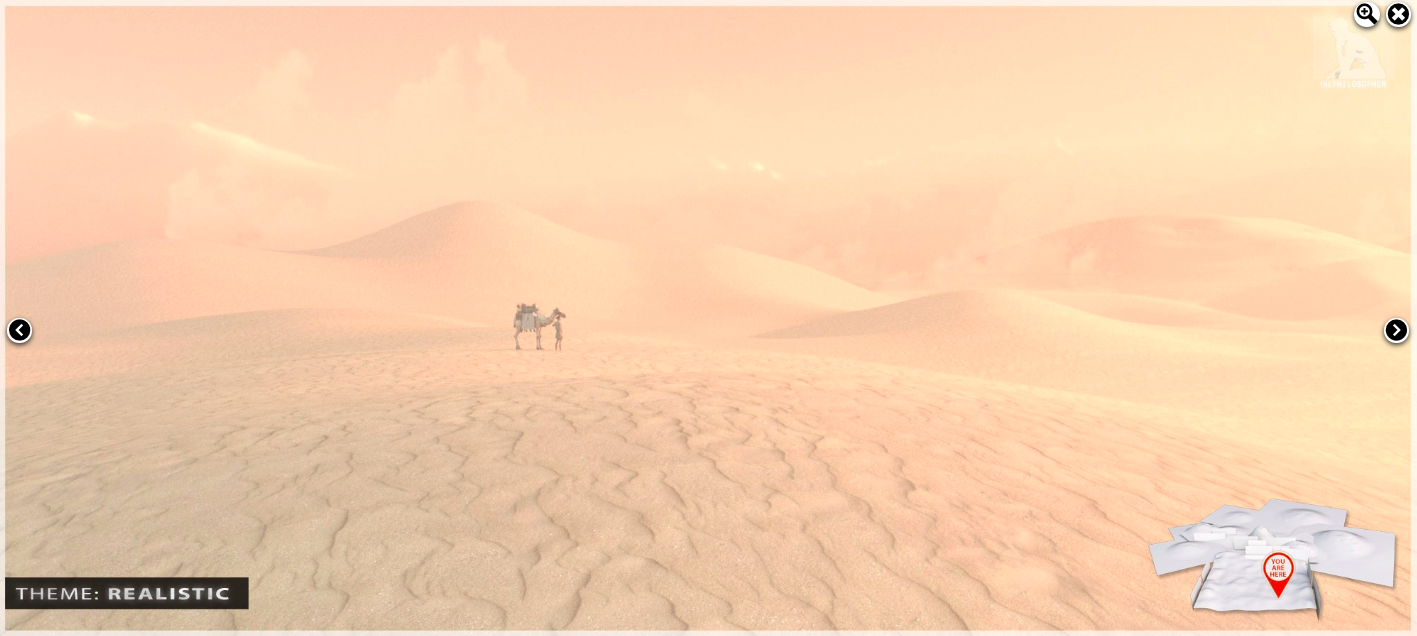
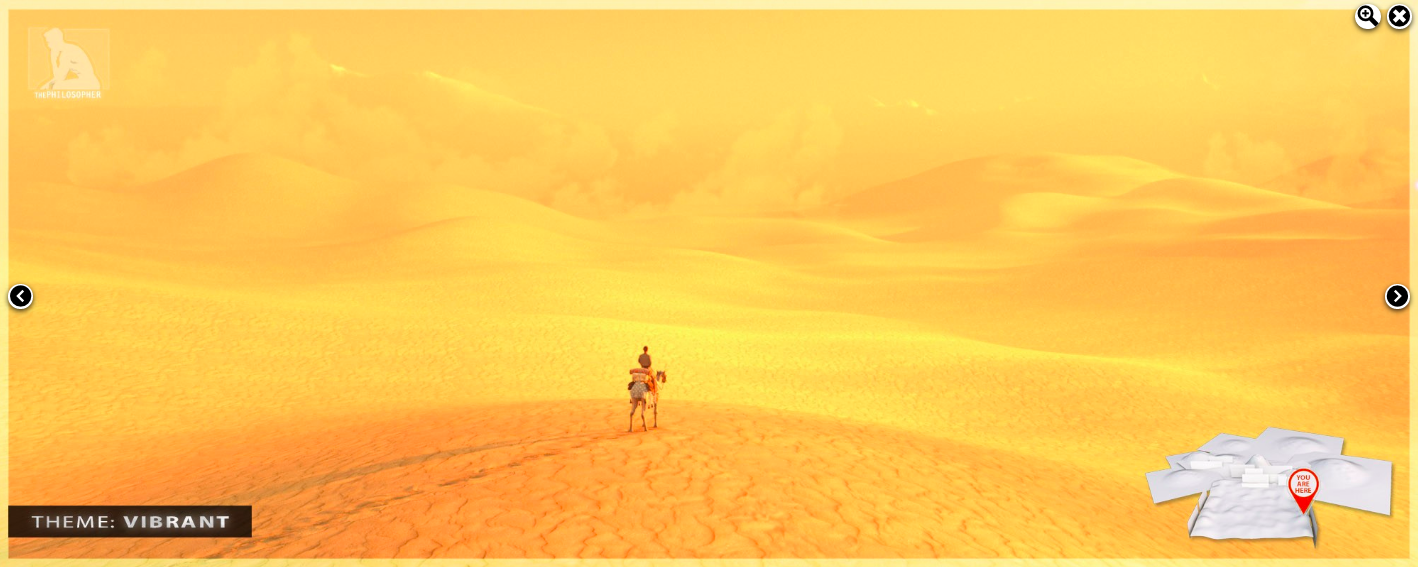
Hängend, wie ein Kokon von der Decke, in der Luft- zerbrechlich und nicht greifbar, wie flüssige Seide, rinnst du von der Schwerkraft angezogen über die steinigen Kanten von Beton. Wie ein Buch, in dem die Buchstaben aus Wasser bestehen, fließt du hinab, durch unsere Hände und sammelst dich auf dem Boden, setzt dich neu zusammen, um im nächsten Moment wieder in tausend Einzelteile zu zerfallen. Immer und immer wieder.
Kleinteilig und unsichtbar spinnst du deine wertvollen Fäden. Du webst mit dem Stoff, aus dem die Träume sind. In dieser Zeit, verkümmert und abgeschieden schließt du die Türe und rollst dich ein. Machst dich klein. Eingekapselt, deine Position mit einem losen Gespinst aus Seidenfäden fixiert, schaffst du instabile Welten, in Wandel begriffen- verankert im Nichts. Und lauschst dem Lärm dieser Welt, dieser grölenden Leere, die du vor uns entfaltest. On the egde of not being (passive) and not producing a thing.
Die feine Seide umschließt deinen Körper. Bewahrt dich vor dem Fall. Sie ist Hülle von bewohntem Raum und inner mind, organisierten Zellen und gewachsenen Flügeln. Du weißt, durchbrechen lassen sich die Wände nur von dir selbst. Und machst dich an die Arbeit, unerbittlich und selektiv in deinem Appetit.
'Noch eine Nacht- schmerzhaft wie Wundbrand und das Volk des Himmels schlägt mit den Flügeln, übt sich im Fliegen und fliegt dann davon' (Choi Seung-Ho)
Now, you are watching a man leisurely climbing a hill on a country road in the middle of the night. Where is he going? If you look closely, this messy man is raising his head to the sky, staggering and muttering something. It is summarized like this:
> At the bottom of Bus nr. 26 is a white dot on a blue background. No, black dots on a white background. Anyway, many of these dots are filling the floor. Although they are numerous, individual dots do not believe in the existence of other dots based on the reason that they are apart, as much as other planets are apart.
The stars in the night sky are floating, never seen with my eyes, and even (perhaps) unable to visually confirm their existence throughout my entire life, but I know that they exist far away from here in space. Ironically, I know that what I want is on the other side of the globe, but I limit myself about what I can do about it. The existence of a star is more real to me than the potential that someone next to me, who has free days, can end up dreaming and achieving something.
Well, let us follow as he continues.
> The dots on the bus floor cannot reach each other, but one should believe a different world exists. And just as I know that there are other worlds in the universe, I have to believe that somebody else next to me exists. Also, when the dots on this floor fade and disappear over time, they don’t have to blame themselves. It is not because of the dots, but because of the insensitivity of shoe soles. Perhaps I don’t have to be too harsh on myself, even when sometimes I’m a wreck.
This is just a question that an untidy man often asked on his way home at night, climbing the hills and looking at the stars embroidered in the night sky over outlines of mountains.
Reference
Milan Kundera, The Unbearable Lightness of Being (New York: Harper Perennial, 2009).
A character assumes the form of a vessel
with no knowledge of an even keel,
unable to resist the dance of forces.
Time rides the waves,
never easy,
never ending.
-Hakeem Adam
Ruhend mit Blick auf den Horizont befinden wir uns in luftleerem Raum, ohne Grenze nach oben und betrachten die fraktalen und geometrischen Formen, ein oberflächliches Geschehen, das Unwetter wirken lässt wie breitflächige Feuerwerke, wie stecknadel-kopfgroße Irrlichter, die sich in unregelmäßigen Lichterscheinungen verflüchtigen.
Ich fühle meinen Sitz unter mir in der Schwerelosigkeit hin- und her wippen. Und werfe einen Blick zurück, langgezogen über alle Dimensionen verstrichen, wie die langen Schattenkegel der Sonne auf tiefblauem Ozean halbschräg unter mir. Catching the light of the sky on its face. That warm shimmering smile, wide and brimming across my line of sight. Eine enorme Anziehungskraft hält mich in ihrem Bann, als wäre ein Seil um meinen Körper gespannt, um mich zu halten, verankert dort, wohin mein Blick geht. Ich sehe ihn unter mir, über mir und vor mir liegend. Einen lebendigen und atmenden Organismus, kraftvoll und verletzlich. Nur von einer hauchdünnen Schicht umgeben, die das in ihr liegende abschirmt und zusammenhält. Ein Außen endet und ein Innen beginnt, ohne dass sie sich voneinander scheiden lassen.
Während Kometen ihre Bahnen ziehen, nähern wir uns dieser feinen Linie und fragilen Lufthülle und tauchen in ihr grünlich- goldenes Leuchten ein, in ihre unterschiedlichen Einfärbungen und Zustände. Es wird ein Flug durch das Feuer. Wir durchbrechen die strömende Luft, wie ein Pfeiler die raue See. Moleküle und Teilchen schleudern an uns vorbei, reiben sich an unserer Oberfläche, kollidieren mit sich selbst oder anderen Strahlungsteilchen, in der unendlichen Fülle von leerem Raum. Sie bleiben aneinander haften, tauschen sich aus, bilden größere Partikel und wachsen zu Wolkentropfen. Der Schweiß steht mir auf der Stirn. All longing is substituted with a bewitching simplicity, a noisy loop waving and crashing.
Ich werfe einen Blick zurück und spüre den Platz, an dem ich saß und heruntergeschaut habe, worin ich mich nun befinde.
در تبعید
مسأله ی سلب برخورداری از امتیازاتی ویژه ممکن است منجر به اخراج یا تبعید شخصی به نقطه ای دیگر از جهان بشود.
تبعید، دستوری تنبیهی از جانب قدرت حاکم که می تواند از سوی یک شخص، یه گروه، یک سیستم قضایی یا یک قبیله باشد، عموما در صورت رعایت نشدن از جانب شخص رانده شده حتما عواقب سنگینی برایش به دنبال خواهد داشت.
تبعیدگاه کجاست و چطور تعریف می شود؟ ساکنین منطقه باید بپذیرند، محل زندگیشان به عنوان عمل تنبیهی به کسی تحمیل شده است.
واقعیت زندگی گروهی چطور تبدیل به کابوس دیگری شده؟ در عین حال که واقعیت زندگی فرد رانده شده دگرگون میشود، پیدا کردن درک جدید از وضعیت در تبعید چه شکلی به خود می گیرد؟
احراز هویت به عنوان فردی در تبعید یا تقدس بخشی به هویت محیط تبعیدگاه و بخشی از ان شدن.
ایا راهی برای شکستن چرخه باطل خشونت وجود دارد که در ان نه فرد مورد مجازات خود را محکوم به تحمل شرایط سخت بداند و نه از ساکنین منطقه ابژه های غریب یا جالبی برای عضو خود بسازد؟
(English translation)
In
Exile
Deprivation of a person from particular privileges can lead to expelling or exiling someone to another place on the planet. Exile is a punishing order from the sovereign power, which could be an order given by an individual, a group, a judicial system, or a tribe. If the subjected person doesn’t follow this order, serious consequences are considered. Where is the exile? How can one define it? The local residents should accept that their living place has been announced as non-livable and that someone has been imposed to live under the condition of non-life as a mode of punishment. The living reality of a community has become a nightmare for the other one. Even though that living of the expelled person is going under transformation, the alternative perception of the exile is up to question. Identifying one as an individual in exile, or embracing it as an authentic other-place are two common paths. Is there a way to break the loop of violence, in which the exiled person neither sees oneself condemned to live the non-life nor exoticizes the living who are there already?
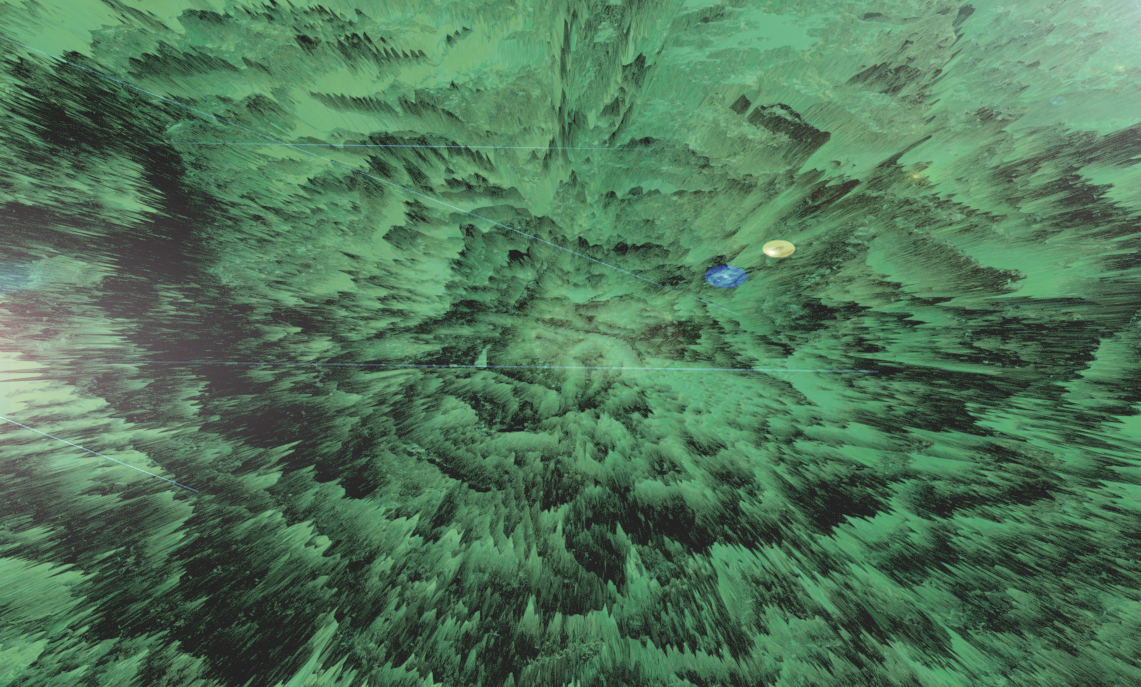
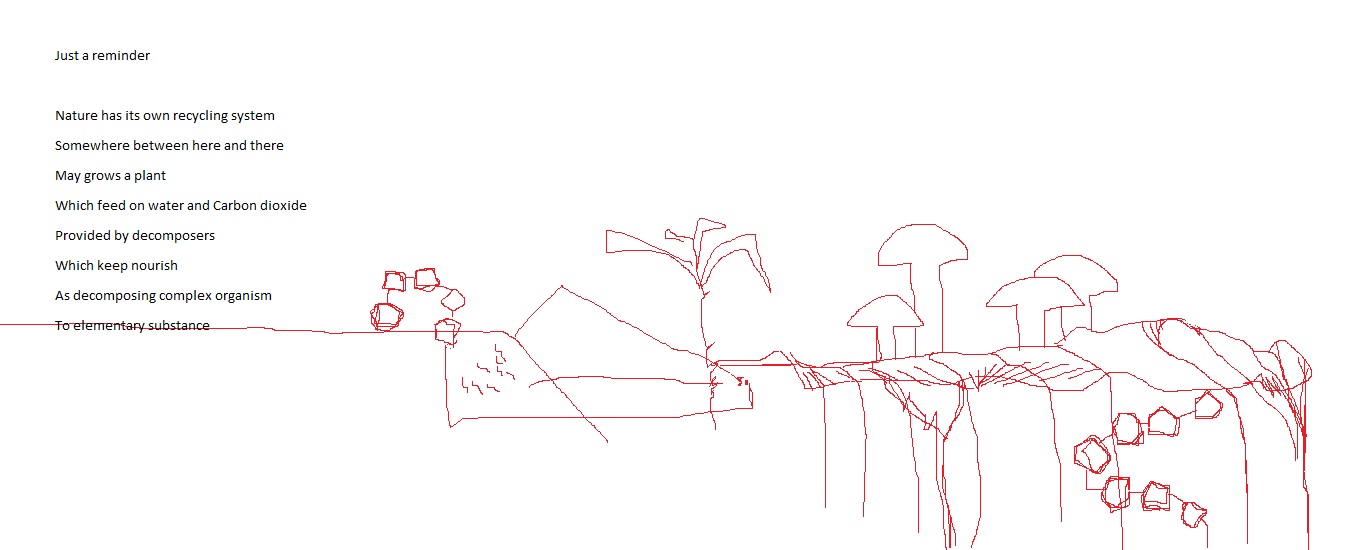
I tried one final test. It was still a cold day, in early spring, and I had thrown my coat and gloves on the sofa.
‘What is this?’ I asked, holding up a glove. I tried one final test. It was still a cold day, in early spring, and I had thrown my coat and gloves on the sofa.
‘May I examine it?’ he asked, and, taking it from me, he proceeded to examine it as he had examined the geometrical shapes.
‘A continuous surface,’ he announced at last, ‘infolded on itself. It appears to have’—he hesitated—’five outpouchings, if this is the word.’
‘Yes,’ I said cautiously. You have given me a description. Now tell me what it is.’
‘A container of some sort?’
Yes,’ I said, ‘and what would it contain?’
‘It would contain its contents!’ said Dr P., with a laugh. ‘There are many possibilities. It could be a change purse, for example, for coins of five sizes. It could ...’
I interrupted the barmy flow. ‘Does it not look familiar? Do you think it might contain, might fit, a part of your body?’
No light of recognition dawned on his face. (Later, by accident, he got it on, and exclaimed, ‘My God, it’s a glove!’ This was reminiscent of Kurt Goldstein’s patient ‘Lanuti’, who could only recognize objects by trying to use them in action.)
No child would have the power to see and speak of ‘a continuous surface ... infolded on itself,’ but any child, any infant, would immediately know a glove as a glove, see it as familiar, as going with a hand. Dr P. didn’t. He saw nothing as familiar. Visually, he was lost in a world of lifeless abstractions. Indeed, he did not have a real visual world, as he did not have a real visual self. He could speak about things, but did not see them face-to-face. Hughlings Jackson, discussing patients with aphasia and left hemisphere lesions, says they have lost ‘abstract’ and ‘propositional’ thought—and compares them with dogs (or, rather, he compares dogs to patients with aphasia). Dr P., on the other hand, functioned precisely as a machine functions. It wasn’t merely that he displayed the same indifference to the visual world as a computer but—even more strikingly—he construed the world as a computer construes it, by means of key features and schematic relationships. The scheme might be identified—in an ‘identi-kit’ way—without the reality being grasped at all.
Reference
Oliver Sacks, The Man Who Mistook His Wife for a Hat and Other Clinical Tests (New York: HarperCollins, 1987), 16-17.
My eyes disobey the view, rejecting the invisible lines we learn not to cross.
Like we learn to lower our voices, suppress our laughs, box-up our joy, betray our rage. They stay shut in protest, against the tyranny of presence. They retreat into the nothingness where geometries lack origin and space is shaped by how deeply we refuse to look.
The tension on the surface, undisturbed, is stronger than the forces it holds in place.
-Hakeem Adam.

Exiles of our time are refugees as Said linked the displaced person to warfare, imperialism, and totalitarian rulers. Those are the dangers the refugee has fled from, yet predominantly all maps tracing refugee routes and populations attribute the refugees rather than the location of danger, the color of warning, disaster, and alarm: the color red.
The weak justification of red being a clear contrasting color that enhances data visualization does not hold in color theory as high contrasts can be developed in multiple color pairings. It is precisely our association of red with danger that allows it to stand out on a map and it is precisely the discriminatory treatment of refugees as threats, risks, and incoming danger that has defined them in red.






Dimension: variable
Description: A three-dimensional software program translates the image into an object. The image describes a weightless and open-ended state. Hovering between utopian promises and dystopian fears, Icarus's repeated fall as a form of touching the ground embodies the pivotal point between what once was and what might be. An intermediate state with an open output, located in a state of suspense. Between presence and response.
Every body thrown vertically, diagonally, or horizontally is located in a state of non-gravitational force and opens up a potential space in its interaction with its environment. Under near weightlessness, the liquid wax forms oil spheres, melting immediately into a new form in free fall. Instability and uncertainty are building stable ground layers out of formless matter. They become certain. Materialized in image and space.
"There would be a whistle, a hum, a hight mumur, and, at last, a song."
Now as we came to an end, ironically for me to complete the circle of thoughts and responses, I shall finish with another poem of the same poet whom I started with, W.H. Auden. He responded to Peter Bruegel’s point of view about Icarus:
“In Breughel's Icarus, for instance: how everything turns away
Quite leisurely from the disaster; the ploughman may
Have heard the splash, the forsaken cry,
But for him it was not an important failure; the sun shone
As it had to on the white legs disappearing into the green
Water, and the expensive delicate ship that must have seen
Something amazing, a boy falling out of the sky,
Had somewhere to get to and sailed calmly on.”
(Musee des Beaux Arts, W. H. Auden)
A drop shadow is caused by the linearity and forms over dimensions
Folding in spacetime
I knot my hair
Immerse myself in other lives and remember what it would be, like if it could be, that it is
Being part of it without moving too much
I become multiplicity
Fine lines running through space and time
Anchored in nothingness
Immeasurable and invisible they carry my body
Growing with spinning movements
Into higher dimensions, up into obscurity
To become condensed infinities
They form space within space
Space for complexity and simultaneity
While I knot my hair they form a container
Filled with emerging memories and confluent narratives
A bag full of stars
Folded in itself.
References
Abbott, Edwin A.. Flatland: A Romance of Many Dimensions. London: Seeley and Co., 1884.
Le Guin, Ursula K.. “The Carrier Bag Theory of Fiction.” Women of Vision. Edited by Denise Dupont. New York: St. Martin's Press, 1988.
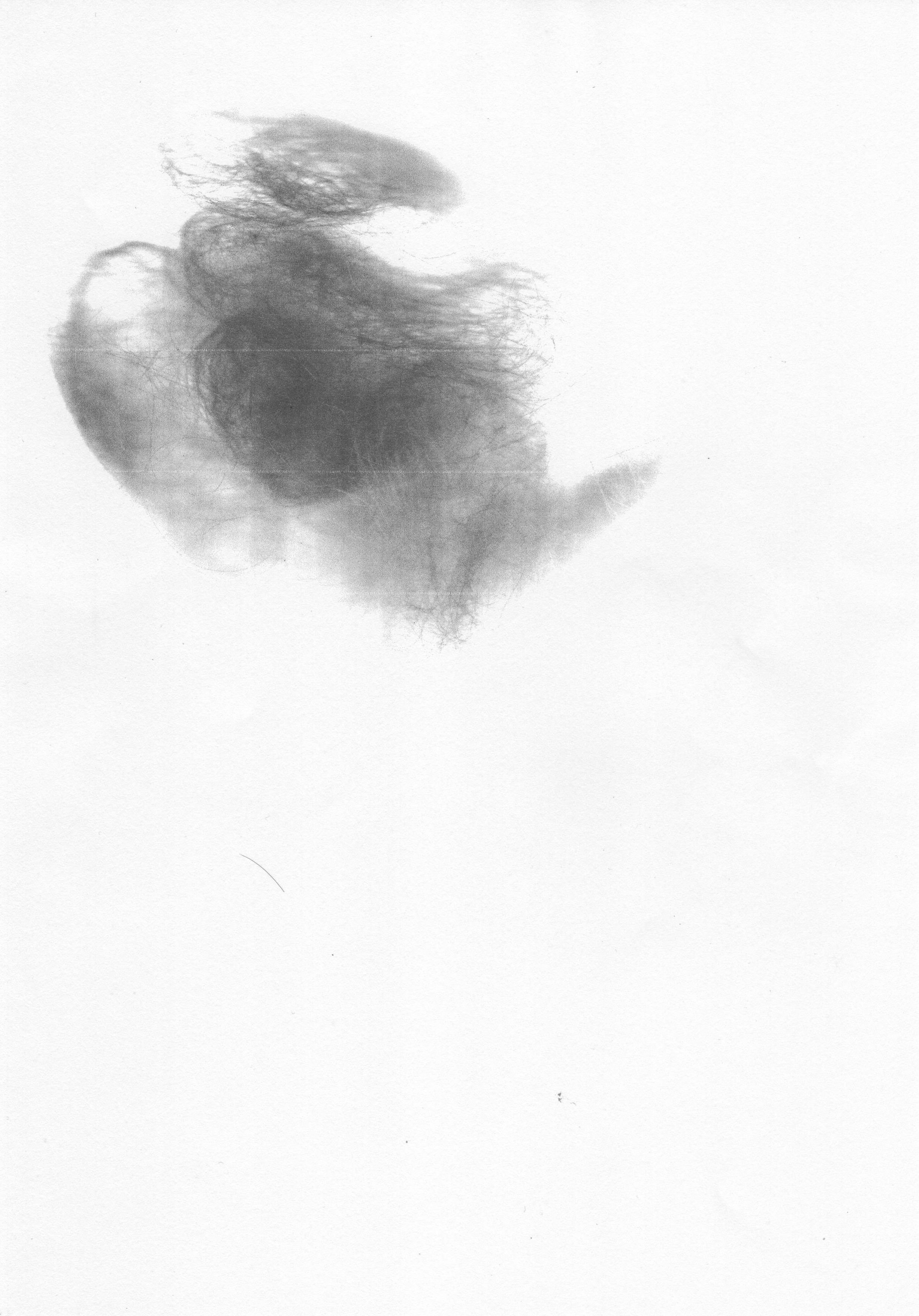
I love nature.
Well, do I really?
After having breakfast, I saw it was time to water the mango tree. The soil was not dried out. I heard from somewhere that this tree came from Southeast Asia, where there is a tropical climate and frequent rain. These days are nice for this small mango tree to grow under sunshine. It is not grounded on a wide land of soil; rather, it is in a small flower pot filled with indoor soil which I bought from a hardware store. Fortunately, this mango tree is not so picky about its home ground. It simply grows, gradually enjoying the sunlight.
Today in the morning, I moved the mango pot around before cleaning the house and found small fruit flies crawling out from the soil of the pot. Immediately, I thought:
> Oh, I should get rid of them soon before they spread all over the room.
However, is it really fair to think about it like this?
What if I was one of the fruit flies? It would be the worst beginning of my day, since now I am suddenly having my life threatened.
Despite my consternation, I will find a way to ignore the flies around the mango tree. After all, this is what I would want me to do if I were a fruit fly.
Well, now can I say that I love nature when I am faced with such a predicament?
Meanwhile, it is still not entirely up to me to choose which action will benefit me the most, or how to reconcile this action with that of another organism that is also just going about their life. This struggle is discussed by Noam Chomsky and Eleanor Wachtel:
CHOMSKY: The hypocrisy of the political leadership doesn’t particularly enrage me. I just take that for granted. But what I do find enraging—I never get over this emotion, though I realize its impropriety—is the way in which the educated sectors behave in the manner of the commissar class. It’s their deceit and distortion and subordination to power, their unwillingness to face the realities in front of them, which just promote an aesthetic or emotional point of view, that I find hardest to tolerate. Maybe because I live in those circles. I should understand that, objectively, that’s their role, as much as it’s the role of a person who wields state power to be deceitful, but the distinction is nevertheless there, emotionally.
WACHTEL: By commissar class, you’re referring to the intellectual world, the media? A world that you expect more from?
CHOMSKY: I don’t expect any more from them and I never did. I don’t want to exaggerate. But in large parts of the media and in educated, respectable sectors rather generally, that strikes me as just appalling and intolerable. If you look back at history, to the earliest sources, this is the way it’s always been. Take the Bible, the earliest literary source that we have, and consider the people who are now respected—the prophets. They were reviled then. They were imprisoned, driven into the desert and hated, in large part because of their moral teaching and because of their geopolitical analysis. A large part of what they gave is what we would today call political or geopolitical analysis. They warned of the consequences of policies that were being taken. The people who were honoured at that time were those whom we now call false prophets, and I think that there are good reasons for that. Obviously, pandering to power will lead to respect and authority and privilege. Condemnation of immorality, of the abuse of power, of the destructive-ness for the general public of the use of power—such policies will lead to antagonism on the part of those who have the capacity to use violence or to organize the masses against people who question that authority. That’s obvious, and the picture that you see in the Bible is one that replicates itself over and over again in every society, including ours.
WACHTEL: I don’t want to accuse you of presumption, but do you identify with the prophets in the Bible?
CHOMSKY: No. I would say that this is true of every critical element in any society. I mention that because it’s a classic example.
How far are they from each other? The desire to have a mango tree without crawling creatures versus seeking to be honored by society?
At this point, I stopped thinking about all these questions and began to look at all the fruit flies hovering and crawling around the mango tree.
Reference
Eleanor Wachtel, Original Minds (New York: HarperCollins, 2003).
The color of my sin.
The veil trailing the setting sun. A card closing the scene. Bleaching all radiance to nothing.
Many sunsets live on this tape. Rolling on with a rhythm that drowns out the freshness of a start or an end. Perpetual motion with no energy loss.
But the Law of conservation of energy is the branch by which I swing in the Southern Breeze. With each loop it shrivels. With each loop it collapses from within, as the fibers crack under the weight I cannot carry.
Till I drop. Into the color of my skin. On the veil that never catches the light but lives in its shadow.
-Hakeem Adam.

By clicking the Print button (or Ctrl + P), your response will be materialized. You can either
print it immediately or choose the 'Print to File' option to save
it as a PDF.
This single A4 page will show your selected route, as well
as the texts and the drawing you might have made on the caring
space.
If you wish for your personal PDF to be part of a physical
exhibition at Circa 106 in the near future, please send your file
to:
info@circa106.info
Response by:
A project originated by the conversations between Aria Farajnezhad, Víctor Artiga Rodríguez and Pablo Somonte Ruano. Curated and organized by Aria and Víctor. Online publication and coding by Pablo.
Texts edited by Will Lee.
Special thanks to Prof. Andrea Sick and Irena Kukrić. As well as the support of The Dynamic Archive and the Hochschule für Künste Bremen.